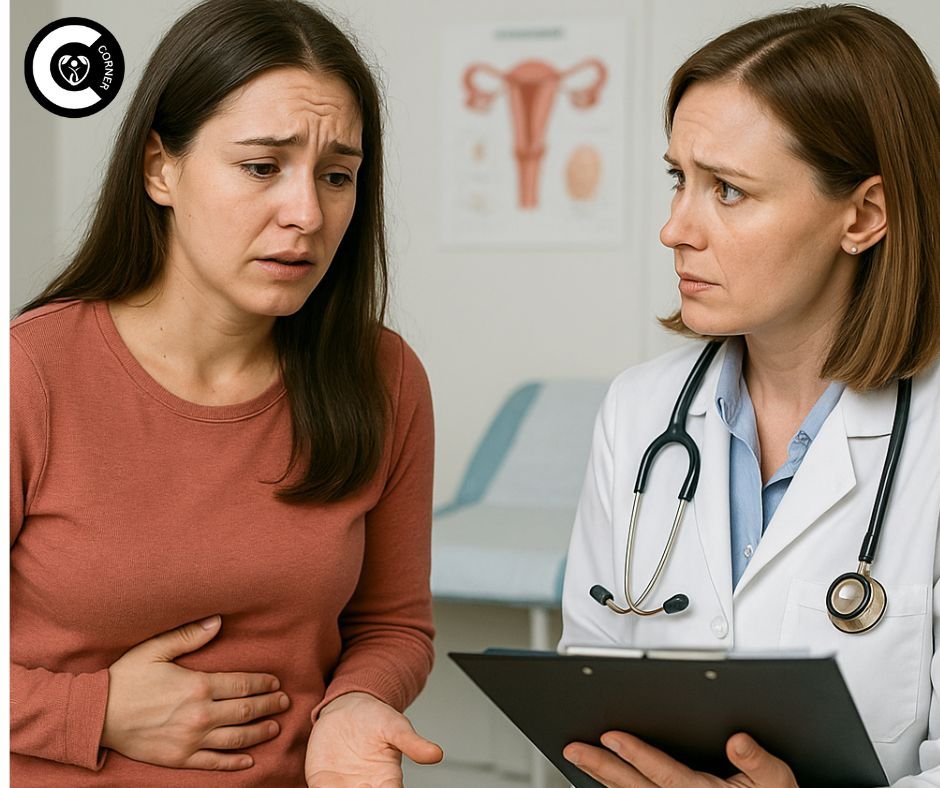Sex should be fun, a time to connect and be close to someone. So, when intense, abrupt pains happen during or after sex, they can be very scary, puzzling, and make you feel very alone. You’re not the only one who has had pelvic cramps during sex or felt pain after the moment is passed. A lot of people, especially those who were born female, have cramps during sex. This is a very frequent problem. Even frequent cramping during sex often goes unspoken. Many don’t know if their pain is ‘normal’ or where to seek help. Let’s figure out what’s going on, look into the various causes, and give you some tips on how to get back to having pain-free intimacy.
What Exactly Is Cramping During Sex? Understanding the Sensation
Women who get cramps during sex usually feel acute, stabbing, or throbbing pains in their lower belly, pelvis, or vagina. These cramps might happen suddenly when you penetrate, get worse with deep thrusting, or even start hours after sex as a sluggish, constant aching. Pelvic cramps during sex are different from regular muscular discomfort since they often feel involuntary and get in the way of enjoyment, making you worry about future intimacy. Muscles, reproductive organs, nerves, or connective tissues can all cause pain. The pattern of the pain—whether it happens just in certain postures, at certain points in your cycle, or all the time—can help doctors figure out what’s wrong. The first step to dealing with this pain in a kind and effective way is to realize that it is caused by biological factors, not psychological ones.
Common Causes of Cramping During Sex
Muscle Tension and Overexertion
One of the most common but often ignored reasons for cramping during penetration is too much tension in the pelvic floor muscles. Stress, worry, past trauma, or even just habitually clenching (like “holding in” during a busy day) can make these muscles, which support the bladder, uterus, and rectum, spasm. When these muscles are tight or weak, penetration can make them even tighter, which can cause sharp pelvic cramping during sex. It’s like a charley horse in your calf, but in your pelvis: a quick, involuntary spasm that hurts and locks up.
Endometriosis: A Silent Aggravator
Endometriosis is a disorder in which tissue similar to that of the uterus proliferates outside the uterus, frequently resulting in cramping during sexual intercourse among female patients. This tissue bleeds and swells during periods, which causes scar tissue (adhesions) to form that hold the pelvic organs together. Deep penetration can tug on these adhesions or make endometrial implants around the cervix, vagina, or ligaments swell, which can cause intense, localized cramping. For many people, this pain gets worse just before or during their period, and it may also be accompanied by heavy periods or stomach problems.
Ovarian Cysts and Their Painful Role
Cysts are fluid-filled sacs that form on the ovaries. They are common and usually not harmful. But bigger cysts, especially ones that break, can produce very painful cramps after intercourse or during deep thrusting. Having sex can put pressure on the cyst, which can make it leak fluid and produce acute, one-sided pelvic pain. Functional cysts, such as follicular or corpus luteum cysts, typically disappear spontaneously, whereas complicated cysts necessitate medical assessment.
Pelvic Inflammatory Disease (PID): Infection-Driven Discomfort
Chlamydia and gonorrhea are two sexually transmitted infections (STIs) that can go untreated and spread into the uterus and fallopian tubes, causing PID. This illness makes the tissues in the pelvis inflamed, which makes them very sensitive. When you get cramps during sex, you may experience a deep, spreading agony along with strange discharge, a fever, or bleeding that isn’t normal. PID needs to be treated right away to avoid scarring and infertility.
Also Read: How To Recover Vaginismus
Vaginismus: When the Body Says “No”
Vaginismus is when the muscles in the vagina spasm without your control, making penetration uncomfortable or impossible. This syndrome is often caused by worry, past trauma, or fear of pain, and it directly causes cramping during entry. The pelvic floor muscles constrict protectively, like a wall slamming shut, which can make the vaginal entrance or deeper in the pelvis feel scorching or cramping.
Other Contributing Factors
- Uterine fibroids: Noncancerous growths that change the shape of the uterus and can cause cramps that feel like pressure during climax or deep intercourse.
- Interstitial cystitis: Inflammation of the bladder that feels like menstrual cramps and usually gets worse after sex.
- Problems with digestion: IBS and other conditions can make pelvic pain feel like gynecological cramps during sex.
- Changes in hormones: Low estrogen levels, which are prevalent during nursing or perimenopause, make vaginal tissues thinner, which makes them more sensitive.
Why Cramping After Sex Happens
It’s very strange to get cramps after intercourse. You might feel good during intercourse, but then you might feel waves of pain in your pelvis minutes or hours afterward. This discomfort that comes later is often caused by:
- Uterine contractions: Orgasms cause the uterus to squeeze rhythmically, which might last for a while.
- Inflammation flare-ups: Endometriosis or PID may get worse when you have sex.
- Referred muscle soreness: Pelvic muscles that have been exercised too hard can hurt after activity, just like legs that have been run on.
- Cervical irritation: Deep sex that hits the cervix may create cramps that get worse with time.
When Should You Be Concerned?
Some symptoms, such as moderate cramping, are typical, while others need to be seen right away:
- Pain that is quite bad or makes it hard to do everyday things.
- Cramps that happen with a fever, vomiting, or excessive bleeding.
- Pain that lasts more than 24 hours after sex.
- A history of missing periods or a positive pregnancy test (this could mean an ectopic pregnancy).
- If you’re over 40, you should see a doctor if you have new, unexplained pain (to rule out ovarian cancer).
If you get persistent pelvic cramps during sex, you should see a doctor. Don’t merely ignore them as “just stress.”
Relief and Prevention: Taking Back Control
Communication and Comfort: Your First Line of Defense
Talking openly with your partner might help ease your anxiety, which is a primary cause of discomfort. Try out:
- Positions that let you control depth (like woman-on-top).
- More foreplay and lubricant to make penetration easier.
- If cramps start, take breaks during intercourse.
Pelvic Floor Physical Therapy: Retraining Your Muscles
Pelvic Floor Physical Therapy: Retraining Your Muscles
Specialized PTs educate you on how to relax and develop your pelvic muscles by doing things like:
- Manual therapy to release trigger points.
- Exercises for breathing and stretching.
- Biofeedback to help you see how well you can regulate your muscles. Research indicates that physical therapy markedly alleviates cramps experienced by female patients during sexual activity.
Medical Treatments: Targeting the Root Cause
- Hormonal therapy: Birth control pills or IUDs help with discomfort caused by endometriosis.
- Surgery: Laparoscopy gets rid of endometriosis cysts or lesions.
- Medicines: Antibiotics for PID and muscle relaxants for vaginismus.
- Nerve blockers: For pelvic pain that doesn’t go away with conventional therapies.
You Are Not Alone: Take the Next Step to Feeling Better
If you have cramps during penetration, pelvic cramps during sex, or cramps after sex that make your life hard, put your health first. Start keeping track of your symptoms, such as when, where, and how the pain happens. Then, see a gynecologist or a specialist in pelvic pain. There are ways to get better, from physical therapy to specific drugs. The first step is to speak out. Your pleasure is important, and being intimate without suffering is not a luxury; it’s your right.





[…] Also read: What Exactly Is Cramping During Sex? Understanding the Sensation […]